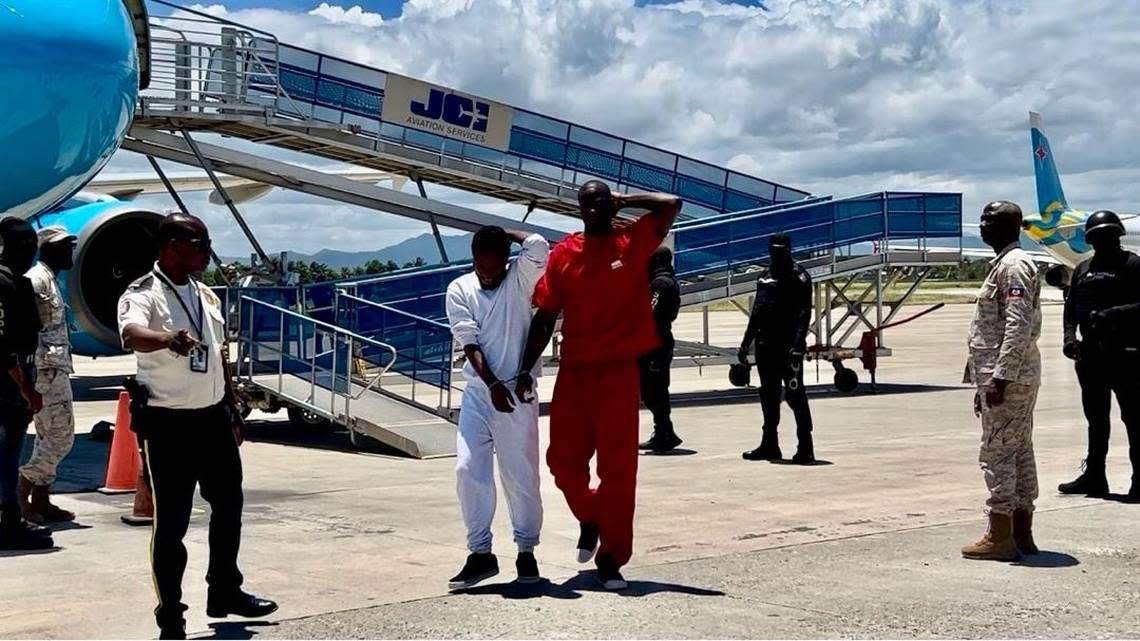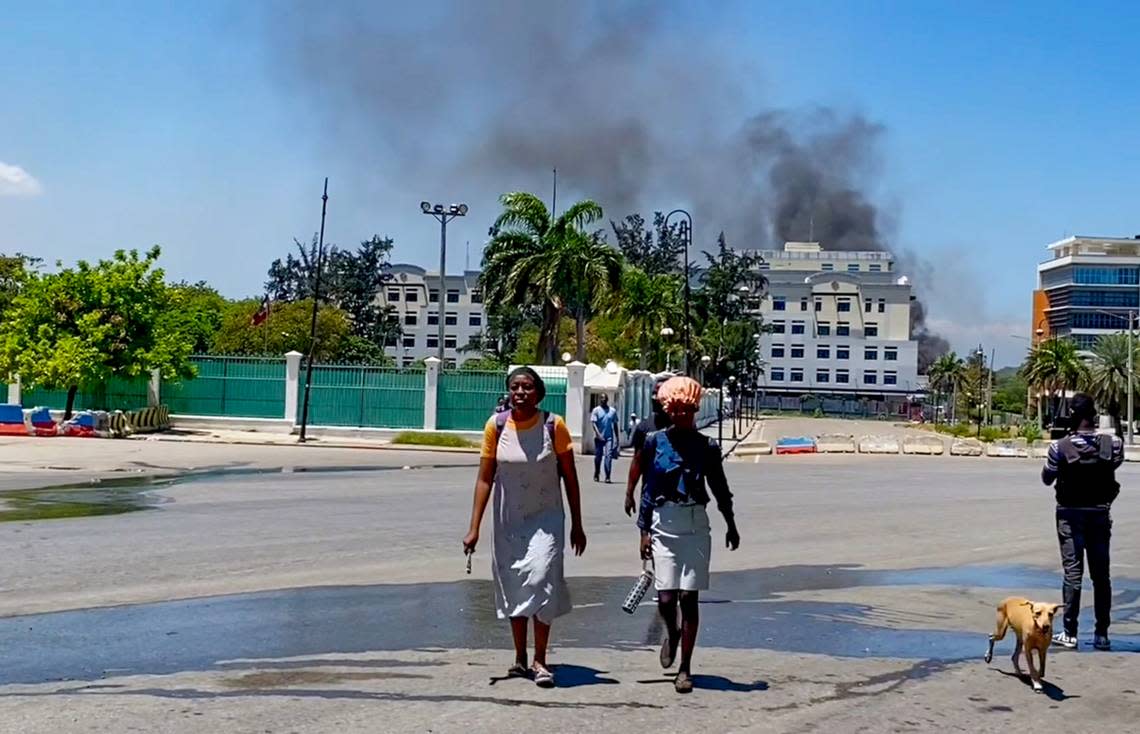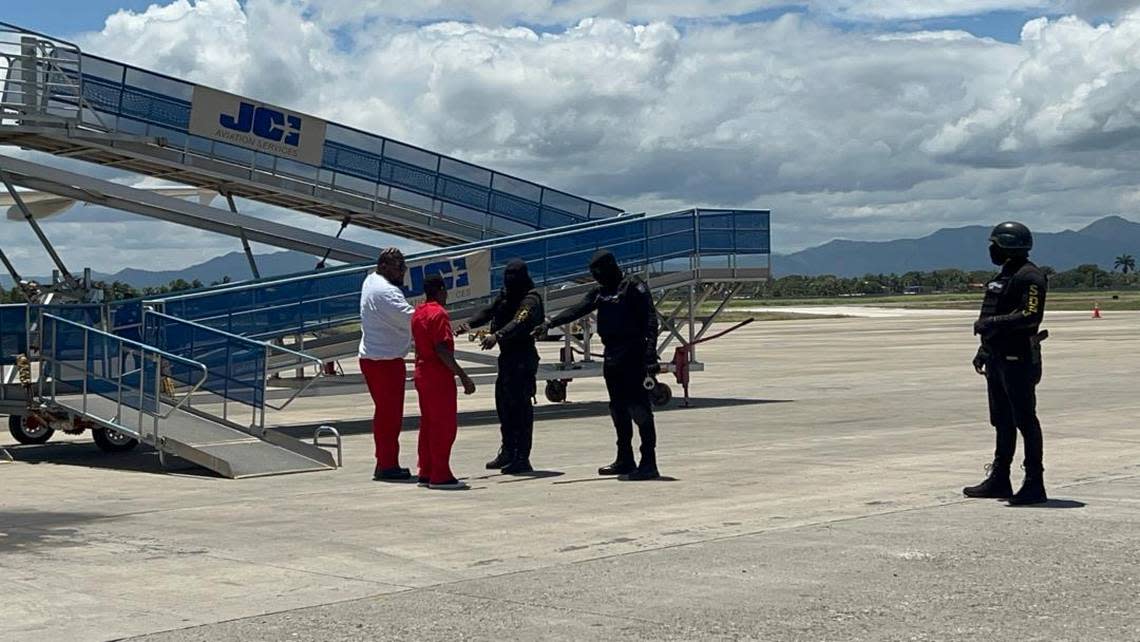Biden administration resumes deportation flights to Haiti amid ongoing violence
Dozens of Haitians expelled from the United States arrived back in Haiti on Thursday in the Department of Homeland Security’s first deportation flight since an ongoing gang insurgency forced the Biden administration to halt a flight with deportees and order the evacuation of Americans.
Haiti’s Office of National Migration said it was informed by U.S. authorities to expect the arrival of 74 Haitians aboard an Immigration and Customs Enforcement flight in Cap-Haïtien shortly before noon on Thursday. In the end, 52 arrived aboard the plane, which left Alexandria, Louisiana and made a stop in Miami before landing in the northern Haiti city.
“The resumption of deportation flights to Haiti is beyond belief. At least beliefs that embrace compassion and humanity,” said Tom Cartwright, an independent volunteer analyst who tracks ICE deportation flights and was the first to spot the Haiti-bound U.S. government charter.
Randolph McGrorty, executive director of Catholic Legal Services in Miami, was surprised as well.
“It is simply cruel to deport individuals to Haiti at this time,” he said. “I am very concerned that we are are not following the law and our international obligations by adequately assessing asylum concerns and basic humanitarian principles.”
Among those deported was Gerson Joseph, a Florida resident for more than 20 years who is engaged to be married and has a daughter who is a U.S. citizen. Joseph, who turns 40 next week, called his lawyer, Philip Issa, on Wednesday informing him that an officer at the Krome Detention Center in southwest Miami-Dade, where he had been detained since November, informed him he would be deported in the morning.
“He should not have been considered what they call an enforcement priority,” said Issa, an attorney with Americans for Immigrant Justice in Miami.

Joseph, who is originally from Haiti’s gang-controlled Artibonite Valley, was first ordered deported in 2005 after he missed his immigration hearing. Last year, after getting arrested for petty theft and burglary, he found himself back in the crosshairs of the Department of Justice, which denied him the opportunity to reopen his immigration case and contest his deportation order, Issa said.
“I want to say that I’m shocked but I’m not. I’m upset more than anything,” Issa said. “Based on what I was reading about Haiti, I couldn’t imagine they could pull this flight off. I didn’t believe it until it actually happened. This administration has not given us any reason to think that it is dealing compassionately with immigrants and so I am upset. I’m disappointed because they are sending him back to a war zone. It’s catastrophic.”
There were 40 men and 12 women aboard the flight. Betty Noel, who is from La Gonâve, an island west-northwest of Port-au-Prince, said she fled Haiti seven months ago after she was victimized by gangs. After spending some time in Mexico, she illegally crossed the border into the United States.
“I left because of insecurity, and today I am back with tears in my eyes,” she said after getting off the flight. “It’s with a heavy heart I am back because my country doesn’t have any security.”

This is the first deportation flight since Homeland Security canceled an ICE Air charter on Feb. 29, the day armed gangs led a coordinated attack on the international and domestic airports in Port-au-Prince before orchestrating the escape of more than 4,000 prisoners during a massive raid on Haiti’s two largest prisons. Since then the violence has continued, with armed groups burning and vandalizing schools, businesses and hospitals while trying to take over the airport and the National Palace.
Amid the attacks, the United Nations, immigration-rights advocates and others have called for a moratorium on deportations to Haiti, citing the humanitarian crisis the country faces. More than 360,000 people have had to flee their homes because of gang violence, and 5.5 million Haitians are in need of humanitarian assistance.
“Just where are these deportees supposed to go?” said William O’Neill, the U.N.’s independent human-rights expert on Haiti. “I would just ask the United States and all countries to halt immediately all deportations to a country that cannot guarantee anyone’s security, where 1.5 million people are facing famine and where embassies are evacuating most of their personnel.”

The administration has dismissed calls from 500 organizations for a complete halt to all deportations to Haiti due to the ongoing armed attacks. Dozens of members of Congress have joined advocates in asking the administration to expand temporary immigration protections for Haitians currently living in the United States.
Earlier this month, DHS Secretary Alejandro Mayorkas said the administration is not considering a renewal or expansion of Temporary Protected Status for Haiti, which has allowed Haitian nationals currently residing in the U.S. to live and work here legally due to unsafe conditions in their home country. He also warned against Haitians attempting to flee the violence and humanitarian crisis. They will be returned, he said, if intercepted.

A spokesperson for DHS said Thursday that U.S. policy is to return non-citizens who do not establish a legal basis to stay in the country.
The U.N. has said that of the Haitians forced out of the homes by the violence over the last three years, nearly 90,000 are in Port-au-Prince, living in squalid encampments. Cholera is on the rise, and access to clean water, medications and medical care is limited. Gangs have destroyed dozens of hospitals and pharmacies and their control of roads have disrupted the flow of aid and food.
The ongoing closure of the country’s main seaport means that hospitals are running out of supplies and store shelves are increasingly bare.
In response to the crisis, the State Department warned Americans to leave and helped hundreds to evacuate via helicopters to the neighboring Dominican Republic and a charter plane from Cap-Haïtien. The State Department warned U.S. citizens living outside of the northern port city of the dangers of traveling by road.
“I am in absolute disbelief at the level of hatred, inhumanity and violence that the U.S. government is perpetuating on Haiti through these deportation flights and sending people to their potential deaths,” said Guerline Jozef, of the San Diego-based, Haitian Bridge Alliance, which last week joined others advocates in asking the Biden administration for a halt to deportations.
“There is no safety in Haiti.,” she added. “This administration must immediately halt deportation flights to Haiti.”

The administration’s last deportation flight to Haiti was on Jan. 18. The next one, planned for Feb. 29, was canceled. In between, however, the U.S. Coast Guard repatriated 65 Haitians to Haiti on March 12 after their vessel was interdicted near Great Inagua, Bahamas.
Jean Négot Bonheur Delva, the head of Haiti’s migration office, said while most of the Haitians attempting to leave by sea are from northern cities and do not face long, dangerous journeys back home, Haitians returning on deportation flights are from all over the country. For them, returning home means traveling through roads and neighborhoods controlled by armed gangs.
Given the ongoing crisis and the limited capacity to help those returning, Delva said, he has asked U.S. officials for a humanitarian reprieve on deportations.
Freelancer Gérard Maxineau contributed to this report from Cap-Haïtien, Haiti.
